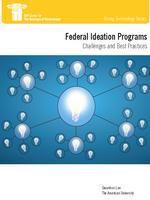
Federal Ideation Programs: Challenges and Best Practices

Ideation platforms are modern tools predicated on an old adage, “None of us is as smart as all of us.” Though that proverb has been widely accepted, collecting and synthesizing the knowledge of “all of us” into actionable next steps has been a daunting task. The rewards for doing so, however, are potentially very high, especially for large organizations in both the private and public sector. It is no surprise that ideation platforms are so heavily used online—within the past few years alone, software developers have created numerous kinds of ideation tools that allow large organizations, including government agencies, to harness the collective knowledge within their organization.
In a basic sense, ideation platforms can be understood as a niche within the crowdsourcing universe. Crowdsourcing can refer to any task divided up and distributed to a large group, while ideation refers specifically to posing questions or concerns for collecting, synthesizing, analyzing, or prioritizing ideas and pointing to next steps.
Many ideation tools have been approved for use by federal government agencies, and more than a few agencies have created their own ideation tools to serve their specific needs. Included in this report are examples of how four federal agencies are using off-the-shelf tools and proprietary applications to harness the knowledge of crowds to help the agencies fulfill their mission.
In addition to the four case studies, Professor Lee presents strategies and tactics that can help agencies develop and implement successful ideation programs. To help readers understand ideation programs, the report outlines three distinct phases: idea generation, evaluation and selection, and implementation. The report concludes with a series of seven recommendations to sustain a federal ideation program, including institutionalizing the activity and creating a lasting organizational unit.



